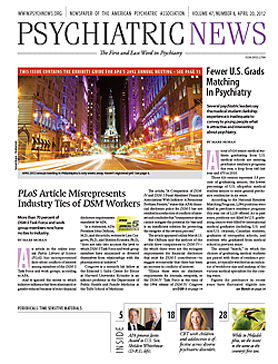This year’s spring meeting of the Group for the Advancement of Psychiatry (GAP) was held shortly after the 2012 residency match results were announced. At the Psychotherapy Committee, we discussed our disappointment that the percentage of graduating medical students selecting psychiatry as a specialty had dropped to 3.9 percent, from 4.1 percent in 2011 (see
Fewer U.S. Grads Matching in Psychiatry). This topic didn’t come up until the last half of the committee meeting, following a stimulating discussion of several papers the group has been working on—one on motivational interviewing, and two on psychotherapy for suicidal patients.
The contrast between our shared enthusiasm while talking about psychotherapy and our discouragement when talking about recruitment of medical students into psychiatry was clear. We spent quite a while speculating about medical students’ views about careers in psychiatry. One member of our committee is a psychiatry resident, and she said that in medical school it’s widely known that “the road to happiness” is to choose one of four specialties: anesthesiology, dermatology, ophthalmology, or radiology. You are guaranteed plenty of business, a good income, controllable hours, and minimal night call.
We thought about what factors are keeping psychiatry off that list, including the following:
The stigma that stubbornly attaches to our patients and our field (including ourselves).
Negative media coverage—claims that psychiatrists in particular are unethically raking in money from industry; that our treatments don’t really work (e.g., that antidepressants are no better than placebos); that we want to label and pathologize normal behavior (e.g., grief following the loss of a loved one); that severe mental illness doesn’t really exist but has been caused by years of medication treatment; that the “mentally ill” are scary, violent, and dangerous; and many more headlines—all in a category I might call “media madness,” exponentially intensified in the Internet age.
Inadequate reimbursement rates for psychiatry from Medicaid, Medicare, managed care, and the insurance industry.
Inadequate salaries from hospitals or academic departments that are insufficient to enable early career psychiatrists to pay off medical school debts and support a growing family.
The shift in the psychiatrist’s role from providing comprehensive psychiatric treatment (psychotherapy and pharmacotherapy) to doing 15-minute “med checks.”
These were only some of our speculations, and they mirror discussions I have had with many of you as I have traveled around the country to district branch and state association meetings. These are real issues, some factual and some perceived (yet powerful), and we have to take them seriously.
But I am struck by another contrast, similar to the one our GAP committee noted—in this case between medical students choosing to go into psychiatry versus those who don’t. I interviewed quite a few medical students this year who were applying for the Baylor psychiatry residency. Almost to a person, students who chose psychiatry did so because they wanted to understand motivated human behavior, and they wanted to understand what goes wrong (and why) when thoughts, feelings, and self-control get out of balance. Most of all, they wanted to connect with their future patients, in human relationships of healing. They were pretty sure that would be hard to do in any other specialty.
I’m sure many of you saw the interesting article by Ben Carey in the April 1 New York Times titled “Where Have All the Neurotics Gone?” Referring to the word “neurosis,” Carey said that the fact “that it means little now, to most Americans, is evidence of how strongly language drives the perception of mental struggle, both its sources and its remedies.” He mentioned studies showing that among college students, “neuroticism” levels have increased by about 20 percent since the 1950s, and he said that “another way to read those numbers is not as a measure of mental makeup but of cultural change”—referring to the social media, and that young people are “awash in self-confession” with “increasing public availability of almost every waking thought…”. It’s curious to ponder that on the one hand, patterns of communication are changing rapidly, while on the other hand, stigma, fear, and lack of understanding surrounding mental illness seem to be written in indelible ink, immune to change.
I, for one, can’t imagine a specialty in medicine that is more fascinating and appealing than psychiatry. We learn new things every day from dazzling medical technology and from giant steps in neuroscience, giving us new ways to understand and help our patients. But we help our patients most by being available, compassionate, predictable, and collaborative. The fundamentals of the therapeutic relationship define our profession at its best and are the heart and soul of patient-centered medicine—this is the message we need to get across to the doctors of the future, and this is the real road to happiness! And maybe this message is particularly important these days, as our changing world gets more and more “neurotic,” making it harder to preserve what our patients need most and what we do best.


